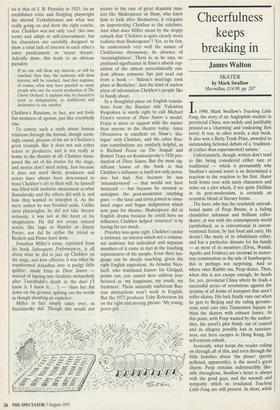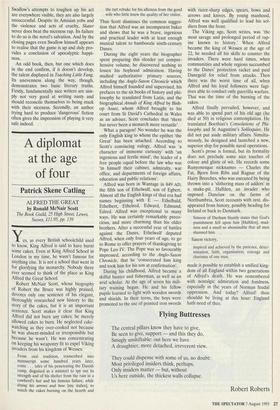Cheerfulness keeps breaking in
James Walton
SKATER by Mark Swallow Macmillan, f14.99, pp. 207 In 1990, Mark Swallow's Teaching Little Fang, the story of an Anglophile student in provincial China, was widely and justifiably praised as a 'charming' and `endearing' first novel. It was, in other words, a nice book. It also won a Betty Trask Prize, awarded to outstanding fictional debuts of a 'tradition- al (rather than experimental) nature.'
Unfortunately, though, writers don't tend to like being considered either nice or traditional — which is presumably why Swallow's second novel is so determined a reaction to the reaction to his first. Skater both brims over with nasty characters and relies on a plot which, if not quite Delillan in its post-modernism, is certainly an eccentric blend of literary forms.
The hero, who has the resolutely untradi- tional name of Peep Bruise, is a failing chandelier salesman and brilliant roller- skater, at war with the contemporary world (symbolised, as is conventional in uncon- ventional fiction, by fast food and cars). He doesn't like many of its inhabitants either, and has a particular distaste for his family — as most of its members (Elvin, Wanda, Apollo and Frisbee) are involved in motor- way construction or the sale of hamburgers, this is perhaps not surprising. And so where once Rabbit ran, Peep skates. Then, when this is not escape enough, he heads for, yes, provincial China where he leads a successful series of revolutions against the tyranny of all forms of transport that aren't roller-skates. His luck finally runs out when he gets to Beijing and the ruling geronto- crats send cars into Tiananmen Square to blast the skaters with exhaust fumes. At this point, with Peep wanted by the author- ities, the novel's plot firmly out of control and its allegory possibly lost in tasteless- ness, our hero escapes to Hong Kong, his self-esteem rebuilt.
Ironically, what keeps the reader rolling on through all of this, and even through the little homilies about `the planet' (pretty polluted, apparently), is the novel's great charm. Peep remains indestructibly like- able throughout, Swallow's heart is always with the good guys, and the warmth and sympathy which so irradiated Teaching Little Fang are still present. In short, while Swallow's attempts to toughen up his act are everywhere visible, they are also largely unsuccessful. Despite its Amisian yobs and the violence and acts of cruelty, Skater never does beat the niceness rap. Its failure to do so is the novel's salvation. And by the closing pages even Swallow himself appears to realise that the game is up and duly pro- vides a conclusion of apocalyptic happi- ness.
An odd book, then, but one which does in the end confirm, if it doesn't develop, the talent displayed in Teaching Little Fang. Its unevenness along the way, though, demonstrates two basic literary truths. Firstly, fundamentally nice writers are sim- ply not very good at writing nasty and should reconcile themselves to being stuck with their niceness. Secondly, an author trying hard to produce 'dangerous' fiction often gives the impression of playing it very safe indeed.



















































 Previous page
Previous page